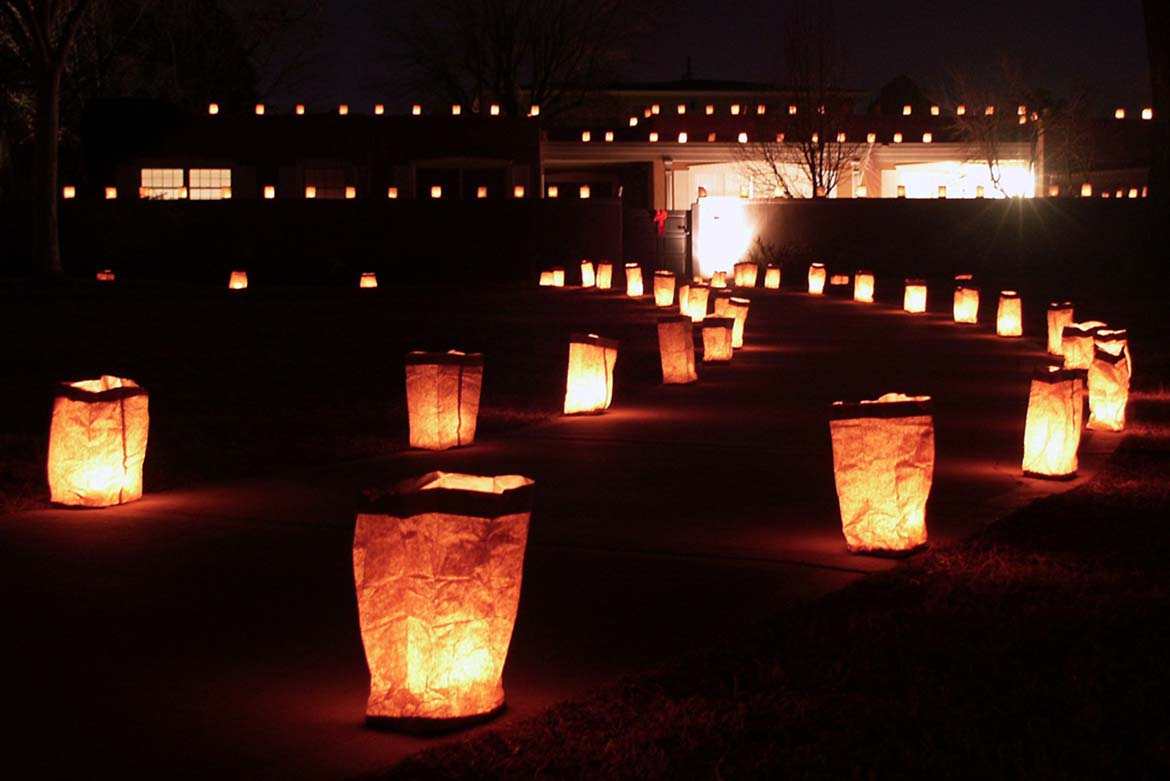
The Litmus Test
I remember the morning well…
It was mid-February and to say I had a lot going on in my life both personally and professionally
would be the understatement of the year. I was feeling both exhilarated and emotionally
exhausted. I was not eating or sleeping well, and I was feeling as if my emotional state was
changing by the minute, if not by the second. Some significant shifts were about to transpire in
my life, and I desperately needed to be on the other side of the month – and it felt like February
was taking forever!
On this particular February morning, I could hear the birds outside and I could see the sun
working hard to get me moving. I had already woken up late and their seemed to be something
wrong with the hot water in my home, so my shower was cold. All this aside, I was looking
forward to my first morning cup of coffee – the one thing that starts my day on the right foot
regardless of which side of the bed I rolled out of. As I walked into the kitchen I grabbed my
coffee mug, filled it with the perfect cup of coffee, and as I turned around the cup slipped out of
my hand and went crashing to the floor. I still can picture the cup shattering and hot liquid
spilling in a million different directions.
What happened next surprised even me…
You see, this type of incident has happened to me before. I am typically moving too quickly in
the morning and not being fully present with myself physically or mentally, so the loss of a
coffee cup and the liquid found inside is not new. This February morning was different – instead
of simply taking in a deep sigh and grabbing the broom, I collapsed on the kitchen floor
hysterically sobbing. The mental health litmus test indicated that I was not doing so well. I had
worked hard to convince myself and others that the balancing act that I was in was going well,
and that the changes on the horizon for me were being greeted with a sunshine emoji. Clearly,
that was not the case. The result: A call to my therapist and a day with self-giving permission to
clear my calendar.
We have all been there. There are days when the Litmus test indicates all is well, and there are
days when the Litmus test indicates we need to step back, breathe, and take a day.
Today, my hope for you is that you can take step back, breathe, and take a day. You invest
yourself in your Callings, your ministries, and to those who support and surround you – and
today, you need to take a look at you saying, “I am a Beloved Child of God.”

Its Mental Health Awareness Month–Now What?
Navigating Clergy Mental Health: Insights for Mental Health Awareness Month
As we delve into Mental Health Awareness Month this May, it’s imperative to shine a light on
the often-overlooked aspect of clergy mental health. Beyond the serene facade, we as clergy
members often grapple with a myriad of mental health challenges, ranging from anxiety and
depression to struggles with personal relationships and self-care. The statistics paint a sobering
picture, revealing the profound impact that the demands of pastoral ministry can have on our
well-being.
According to data from the Duke Clergy Health Initiative, Wespath Benefits and Investments,
and the Center for Disease Control, anxiety rates among clergy stand at a staggering 13.5%,
significantly higher than the general population’s 4.2%. Depression, too, rears its head with
alarming frequency, affecting 23% of clergy compared to the standard 8.6% reported by the
CDC. What’s even more concerning is that over 8% of clergy grapple with both depression and
anxiety simultaneously.
Perhaps one of the most poignant revelations from the research is the prevalence of personal
challenges faced by clergy members. Shockingly, one in six clergy members leave the ministry
annually, highlighting the toll that the profession can take on individuals. Moreover, the high
rates of divorce, lack of meaningful hobbies outside of the church, and difficulty in fostering
close friendships paint a picture of isolation and emotional strain.
These numbers underscore a harsh reality: we, as clergy members, are not immune to the trials of
mental health. In a world where mental health is still stigmatized and misunderstood, it’s crucial
to recognize that we are not exempt from these struggles. Our mental health impacts not only our
personal well-being, but also our ability to effectively serve our congregations and communities.
Ignoring these challenges only perpetuates a cycle of suffering and disconnection.
So, what can we do to support our mental health during Mental Health Awareness Month and
beyond? First and foremost, we must foster open conversations about mental health within our
religious communities. By destigmatizing mental illness and encouraging one-another to
prioritize our well-being, we create an environment where seeking help is seen as a sign of
strength rather than weakness.
Additionally, researching and utilizing mental health resources and support networks is crucial.
Whether it’s through counseling services, peer support groups, training programs on self-care and
boundary-setting, or retreats, investing in our well-being is an investment in the health of our
communities.
As we embark on this journey of intentional awareness and advocacy, let us remember that we,
as clergy members, are human beings with our own struggles and vulnerabilities. This Mental
Health Awareness Month, let’s commit to shining a light on clergy mental health and working
towards a future where no one suffers in silence.

Discernment by Nausea in a Season of Remembrance
I recently heard the phrase, Discernment By Nausea and I was immediately drawn to it. Perhaps it is because of the season of Lent that we are entering into or perhaps it is because of the season I have personally found myself in and perhaps it is a little bit of both!
The thought behind this phrase is that we often play it safe when it comes to our lives in faith. We get comfortable in the predictability of our day to day’s – the rhythm of waking up and having that first cup of coffee, walking into our offices and preparing for the day ahead, and simply doing the work instead of experiencing the work that we have been called to. This calling is not always a comfortable experience for us and can make us feel a little queasy at times, but the process of pulling us from that which is uncomfortable to experiencing the fullness of that which we are continually being called to is a process worth exploring.
I encourage each of you to take a deep breathe in and begin to contemplate where the Spirit is leading you – perhaps out of your comfort zone into a season of Discernment By Nausea!
The Chrysalis Team is here to offer support and guidance in this and every season.
Care to you this day,
The Chrysalis Team
Learn More
The Most Wonderful Time of the Year…Maybe
The Christmas season has always been a mixed bag for me. Even as a young child and the child of a female pastor in the 1980’s, I felt both the joy and struggle of the season. I believe it was as if the pressures of the holidays and the hustle and bustle were simply too much for my little body to take in. I vaguely remember many Christmas Ev’s feeling as if the Church took precedence over family gatherings and our own joy and excitement as a family around the season, and I was not going to take it! So instead, I was often found lying on the back pew of the pristinely-decorated sanctuary, in a puddle, with my lite candle in hand, with wax dripping all over my newly-pressed Christmas dress.
As a pastor and a mother, I find myself carefully attempting to find a balance between the Church and intentional time with my daughter, so she does not feel and ‘The Church Vs. Family’ situation that I so often experienced. I will admit, I am more so successful at this depending on the year, and arguable the moment. As we all know too well, the Church this time of year does not necessarily or immediately bring a fullness of joy and celebratory emotions to those of us working the line, rather it often produces a frantic rush to assist support staff in decorating and preparing the sanctuary, ensuring the Advent candles are placed so that they will not immediately fall of their stands if breathed on incorrectly, and the worship services are just right – all so everyone knows that this is The Most Wonderful Time of The Year.
The truth is, we are not all that our Christmas Card family photos portray. We are each human beings just trying to create and truly feel a joyful spirit for ourselves and those we care so deeply for.
This year, I encourage each of you (myself included!), to get plenty of exercise, sleep, and rest. Be mindful of your needs, create meaningful connections with those you love dearly, breathe deeply, and give yourself the grace that you tell others to give themselves.
Blessings to you and know that we at Chrysalis are here for you to listen and help you find the hope, love, joy, and peace that this season is all about!
The Chrysalis Team
Learn More
Faith and Ministry
One of the issues that can exist for pastors is the blurring of the delicate line between faith in God and loyalty to the church. We hear the story often at Chrysalis Counseling for Clergy. A person experiences the grace of God in a profound way, they have a sense of calling to serve God, and they find a way to live out that calling in the church. In one sense this is the beauty of communities of Christ that nurture the gifts of people and empower them to serve.
But what happens when a person’s experience of the church is a difficult one? What happens when a pastor and a congregation are at odds? What happens when a pastor experiences burnout, physical, or mental health issues, in their ministry? Sometimes the experience of ministry makes clergy question their own faith in God. In these moments clergy may equate faith in God with “successful” ministry. Conversely, they may consider the difficulties of ministry as a failure, or lack of faith. In these moments clergy sometimes create a cause/effect relationship between ministry and faith. This is when we at Chrysalis start hearing phrases like, “I just need to pray harder… I need to be more faithful…I can’t forgive myself…”.
Perhaps a healthier understanding of this tension would be to remember that ministry is an expression of our faith in God. Ministry is the vocation in which we live out our faith, but ministry in and of itself is not our faith. Instead, our faith is in God through Jesus Christ and the Holy Spirit. God will never fail us. God’s love is steadfast and unfaltering. Ministry has ups and downs. Ministry has peaks and valleys. Because ministry it is inherently tied up with people it is an experiment in the tension of sin and grace. People can fail us and we can fail people. God’s love never fails.
Perhaps this is why it is helpful for clergy and ministry leaders to make frequent analysis of their own spiritual life and practices. A list of devotional and formative practices that inspire and ground clergy is too numerous to compile here. However, clergy tend to know—whether they admit it or not—if they are really paying attention to the spiritual life.
At Chrysalis Counseling for Clergy we are here to walk alongside clergy in supportive ways. If you are struggling with a scenario like the one described above we can help:
- Differentiate between faith and ministry
- Plot out constructive life/ministry balance
- Help identify spiritual practices
- Listen
We are here to help.
Learn More
Light
One of my favorite moments during the entire year, is when the 11:00pm Christmas Eve service is completed and I get in my car and I drive around town looking at the farolitos – it’s a perfect time to see them because they are starting to fade a bit but still keeping their light going, as if to say, “I’m still here!”
And I know this feeling – when my light is fading a bit but I’m still working to stay present in the moment and to say, “I’m still here!”
But, what does it feel like when the light has gone out on us? What do we do when we can’t see or feel or know this light we hear so much about?
I must confess that even as I hear this question it feels slightly passive aggressive to me – as if I am implying that something is wrong when we can’t see, touch, feel, or know this ever-present light. As if our faith is mostly a mechanism to bypass negative emotions in favor of delusional positivity.
I have faith. And right now, I have faith that sometimes light is hard to see, and to know, and to feel – and yes, I believe that “the light will shine and the darkness shall not overcome it.”
So today, I ask you to consider: Where does the light overcome – where is the invitation to bring the light in? What is the darkness that hides the light and what do you need to do to invite the light in?
In Grace, Kelly


